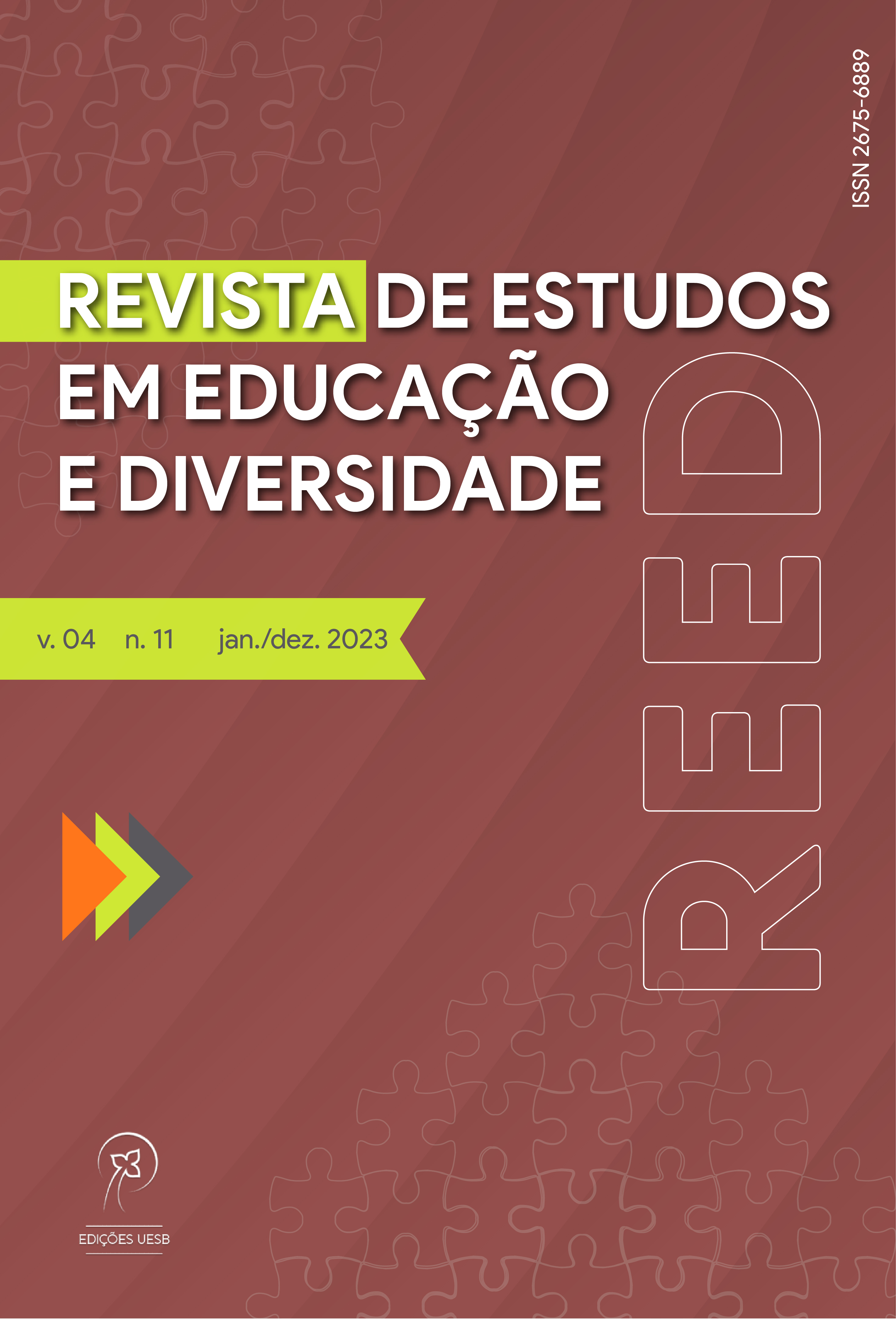Uncomplicated electronic distribution: learning through play
DOI:
https://doi.org/10.22481/reed.v4i11.14057Keywords:
playful activity, learning, chemistry teachingAbstract
This work will present the importance of playful activities as a tool capable of helping students understand the content, with the aim of providing solid knowledge about chemistry. Considering that recreational activities in the educational context go beyond simple entertainment, this study proposed the implementation of recreational activities at the Federal Institute of Science, Education and Technology of Bahia - Campus Ilhéus. The topic covered is electronic distribution, and the activity was proposed by participants in the Institutional Teaching Initiation Scholarship Program. During the creation of the game, low-cost materials were used to facilitate its creation. During the application of the game, students' reactions, their level of collaboration, motivation and teamwork were observed. As a data collection instrument, students were asked to answer a questionnaire administered after participating in the proposed activity. The analysis method used was Discursive Textual Analysis. Through the analysis, it was possible to observe the incidence of three categories aimed at students' motivation when participating in the activity, increasing autonomy and teamwork. Given this, it is possible to infer that the use of games as a pedagogical tool can be effective as a method of helping students understand the content. It can be concluded that such activities played an important role in the teaching and learning of chemistry.
Downloads
References
BATISTA, A. D.; DIAS, L. C. O. processo de ensino e de aprendizagem através dos jogos educativos no ensino fundamental. Colloquium Humanarum, v. 9, n. especial, p. 975-982, 2012.
LIMA L. R. F.; BELLO, M. E. R. B. Onde se escondeu a química? Dessa vez na cozinha! Desmistificando a química nas séries iniciais do ensino fundamental. Experiência em Ensino de Ciências, v. 10, n. 2, p. 26-56, 2015.
KISHIMOTO, T. M. Jogo, brinquedo, brincadeira e educação. Porto Alegre: Artmed, 1996.
KNESER, C.; PLOETZNER, R. Collaboration on the basis of complementary domain knowledge: observe dialogue structures and their relation to learning success. Elsevier, v.11, n. 1, p. 53-83, 2001.
MESSEDER NETO, H. S.; MORADILLO, E. F. O lúdico no ensino de química: considerações a partir da psicologia histórico-cultural. Química Nova na Escola, v.38, n.4, p 360-368, 2017a.
MESSEDER NETO, H. S.; MORADILLO, E. F. O jogo no ensino de química e a mobilização da atenção e da emoção na apropriação do conteúdo cientifico. Ciência & Educação, Bauru, v. 23, n. 2, p. 523-540, 2017b.
MORAES, R.; GALIAZZI, M. C. Análise textual discursiva. Ciência & Educação, v. 12, n. 1, p. 117-128, 2006.
OLIVEIRA, S. J.; SOARES, M. H. F; VAZ, W. F. Banco Químico: um jogo de tabuleiro, cartas, dados, compras e vendas para o ensino do conceito de soluções. Química Nova na Escola, v. 37, n. 4, p. 285-293, 2015.
PAJARES, F.; SCHUNK, D. H. Self-beliefs and school success: self-efficacy, self-concept, and school achievement. Ablex Publishing, London, p. 239-265, 2001.
RIBEIRO D.; NEVES, F.; MOREIRA, S. M. 2023, Dicio- https://www.dicio.com.br/aurelio2/
SILVA, H. M. N.; MORADILLO, E. F. Lúdico no Ensino de Química: Considerações A partir da Psicologia Histórico-Cultural. Química Nova Escola, v. 38, n. 4, p. 360-368, 2016.
SOARES, M. H. F. B. Jogos para o ensino de química: teoria, métodos e aplicações. Química Nova Escola, v. 31, n. 3, 2009.
SOUZA, E. C.; SOUZA, S. H.; S. BARBOSA, I. C. C.; SILVA, A. S. O Lúdico como Estratégia Didática para o Ensino de Química no 1º Ano do Ensino Médio. Revista Virtual Química, v. 10, n. 3, p. 449-458, 2018.
SOUZA, H. Y. S.; SILVA, C. K. Os dados orgânicos: um jogo didático no ensino de química. Holos, v.3, p. 107-121, 2012.
STOCKWELL, B. R.; STOCKWELL, M. S.; JIANG, E. Group problem solving in class improves undergraduate learning. ACS Central Science, v. 3, n. 6, p. 614–620, 2017.
VYGOTSKY, L. S. O papel do brinquedo no desenvolvimento. In: A formação social da mente. Educação e Pesquisa, v. 44, p. 1-4, 2018.
WEHMEYER, M. L. A unctional model o sel- determination: describing development and implemeting instruction. Focs on Autism and Other Developmental Disabilities. Instituição of Education Science, v.14, n.1p.53-61,1999.
Downloads
Published
How to Cite
Issue
Section
License
Copyright (c) 2023 Revista de Estudos em Educação e Diversidade - REED

This work is licensed under a Creative Commons Attribution 4.0 International License.
You are free to:
Share - copy and redistribute the material in any medium or format; Adapt - remix, transform, and build from the material for any purpose, even commercially. This license is acceptable for Free Cultural Works. The licensor cannot revoke these freedoms as long as you follow the terms of the license.
Under the following terms:
Attribution - You must appropriately give credit, provide a link to the license, and indicate if any changes have been made. You may do so in any reasonable way, but not in a way that suggests that you or your use is endorsed by the licensor.
There are no additional restrictions - You cannot apply legal terms or technological measures that legally restrict others to make any use permitted by the license.






